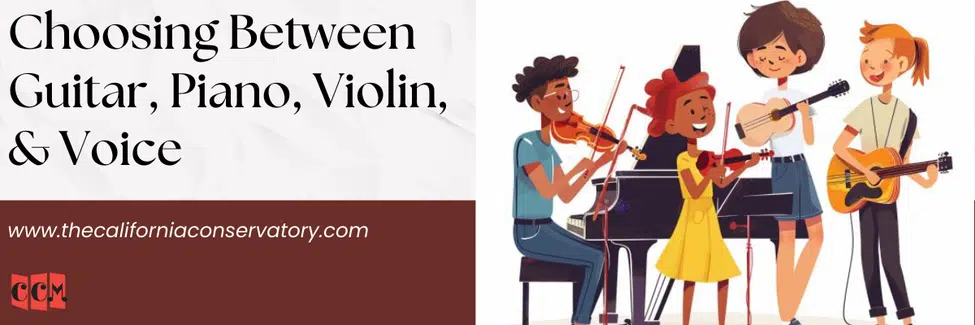July 2, 2024
Choosing Between Guitar, Piano, Violin, and Voice Lessons: A Parent’s Handbook

When it comes to enriching your child’s life through music, selecting the right instrument can play a pivotal role in their long-term enjoyment and commitment. Each instrument, be it guitar, piano, violin, or the unique instrument of voice, offers distinct advantages and challenges. This comprehensive guide is designed to help parents navigate through the decision-making process, ensuring that the chosen instrument aligns with their child’s interests, personality, and developmental goals.
Understanding Each Instrument
Before diving into which instrument might suit your child best, let’s explore the basics of each option:
- Piano: Often considered the cornerstone of musical education, piano lessons provide a robust foundation in music theory. The layout of the keys helps students understand musical constructs such as scales, chords, and intervals with clarity. Moreover, the piano’s ability to play melodies and harmonies simultaneously offers a complete musical experience.
- Guitar: Popular and versatile, the guitar is a staple in many music genres ranging from classical to flamenco, rock, and jazz. It’s relatively easy to start making pleasing sounds, which can be encouraging for young beginners. Guitar lessons can enhance hand-eye coordination and fine motor skills, thanks to the intricate finger placements and strumming techniques required.
- Violin: Known for its beautiful, expressive sound, the violin is a central instrument in orchestras but is also used in folk and popular music. Learning the violin is excellent for developing concentration, posture, and discipline, as it requires precise technique and attention to detail. Don’t be intimidated though – At CCM, we have amazing beginner violinists starting at age 4. Yes, there are violins that small!
- Voice: Unlike other instruments, vocal training enhances an instrument that everyone possesses. Voice lessons focus on pitch, tone, and breath control and can be a wonderful way to boost confidence and emotional expression. At CCM, our voice students can focus on a variety of genres like classical, musical, pop, jazz, and more!
Factors to Consider When Choosing an Instrument
1. Child’s Interest
Listening to what your child is naturally drawn to is crucial. Pay attention to the type of music they enjoy, and if possible, let them try out different instruments before making a decision. A child’s enthusiasm for an instrument will often fuel their dedication and practice. At CCM, we offer every student one free introductory lesson so that they can make sure it’s a good fit before signing up for the regular weekly lessons!
2. Personality and Learning Style
Each instrument may cater to different personalities. For instance:
- Piano might suit methodical thinkers who can sit at one spot and enjoy creating a rich tapestry of sounds.
- Guitar could be ideal for those who like to experiment and possibly perform more casually or socially.
- Violin may suit disciplined individuals who value precision and detail.
- Voice is great for expressive children who enjoy performing and storytelling through song.
3. Physical Compatibility
Consider the physical demands of the instrument. For example, the violin and guitar require different postures and can be size-specific, especially for younger children. The piano demands fine motor skills and hand independence that might be challenging for children under 5.
4. Availability of Teachers and Learning Resources
Accessibility to quality instruction is another important factor. Check out our availability here – we offer both virtual and in-person lessons at our Redwood City or Sunnyvale locations. Additionally, our private guitar and violin students can also join our ensemble programs during the fall or spring!
5. Commitment Level Required
All instruments require consistency and commitment. We encourage all CCM students to practice for at least 10 minutes each day. We offer fun daily practice challenges and weekly goal rewards to get students in the groove of practicing consistently. CCM students also have plenty of performance opportunities throughout the year – these give students something to work towards and stay motivated.
The Role of Music in Child Development
Beyond the joy of music itself, learning an instrument can profoundly impact cognitive development, improve academic skills, and build social and emotional competencies. Music education enhances language skills, increases memory capacity, improves attention span and concentration, and offers a unique form of emotional release.
Exploring Programs at California Conservatory of Music
At CCM, we offer tailored programs in guitar, piano, violin, and voice, designed to meet students where they are and help them achieve their musical and personal goals. Our experienced instructors are dedicated to fostering a supportive environment where all students can thrive and discover their potential.
Choosing an instrument for your child involves considering their interests, personality, and your family’s lifestyle and resources. Whether it’s the piano, guitar, violin, or voice, each instrument offers unique benefits that can enrich your child’s life in immeasurable ways. At the California Conservatory of Music, we are committed to guiding each student through their musical journey with expert instruction and supportive community. If you’re considering music lessons for your child, we invite you to explore our programs and join our community where music education is about much more than just notes and rhythms.
Sign up for your free introductory lesson at The California Conservatory of Music!

